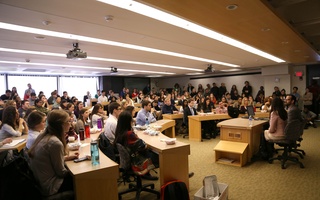UPDATED: August 7, 2015, at 2:42 p.m.
About a year after Harvard overhauled its University-wide framework for addressing sexual assault on campus, Harvard Law School has received the federal government’s feedback on its plan to break from those central policies. It made final changes to its school-specific Title IX procedures this summer, and they will go into effect this fall.
Unlike the procedures for students at other parts of the University, Law School students involved in cases of alleged sexual harassment will now be guaranteed access to an attorney, paid for by the Law School, during the different stages of a case. After professional investigators examine a case, a separate adjudicatory panel, whose members are not affiliated with Harvard, will determine guilt, potentially after a hearing. A school-specific Title IX committee, staffed by tenured professors, will oversee the process for investigating and adjudicating cases of alleged sexual misconduct between Law School students. {shortcode-177c7b87f8a2b7c35f25189595e233590e789818}
The process is a departure from what applies to students accused of sexual misconduct at other Harvard schools, whose complaints are investigated and adjudicated by professional investigators in a central University office, the Office for Sexual and Gender-Based Dispute Resolution. The Law School is now the only Harvard school whose student cases will not go through ODR.
Law School faculty members voted to adopt the new set of procedures last December, but were awaiting a final notice of approval from the U.S. Department of Education’s Office for Civil Rights. The office was reviewing them as part of a resolution agreement from when it found the school in violation of anti-sex discrimination law Title IX last year. The Law School received initial feedback in February from OCR and submitted an updated version of the procedures for additional review.
Months later, in late June, the Law School, still without final approval, notified the federal office that it was planning to implement the procedures soon, according to Robb London, a Law School spokesperson. After that notification, OCR sent the Law School several suggested edits. The Law School made them, including the addition of a sentence clarifying that the school’s Administrative Board will not be involved in sexual harassment cases.
The school’s website is now updated to display the new procedures, and the school has filled all new staffing positions associated with them, London wrote in an email.
The apparent implementation of the school’s procedures marks the close of a lobbying process that Law School professors, unhappy with Harvard’s new approach to Title IX, began last year. Harvard’s new policy and procedures, unveiled last July, altered its new definition of sexual harassment and centralized its process for handling cases, a fact administrators lauded as a positive step forward. It also adopted the preponderance of the evidence standard for determining guilt.
But quickly afterward, both in closed-door meetings with top University officials and in an open letter published in The Boston Globe, several Law School professors pushed back. They charged that the University’s framework was biased against the accused and did not offer adequate due process.
Following the criticism, central administrators allowed the Law School to draft its own process for adjudicating cases and, essentially, go its own way to address the highly controversial issue.
During the drafting process, Law School faculty lobbied a drafting committee to break completely from the University’s centralized approach, and the new procedures reflect those requests. The Law School still abides by the University’s policy defining sexual harassment, despite further concerns from some Law School faculty.
The Title IX debate at the Law School has held sway, due in no small part to its highly-public rebuke of the University in the Globe, in the ongoing national debate about how institutions of higher education should address sexual assault on campus.
The discord between the Law School and central administrators has also made some Law professors increasingly wary of centralized administrative rule at Harvard.
—Staff writer Andrew M. Duehren can be reached at andy.duehren@thecrimson.com. Follow him on Twitter @aduehren.Read more in University News
Zoning Board Delays Campus Center Plans a Second TimeRecommended Articles
-
 Law School Appoints Title IX Committee
Law School Appoints Title IX Committee -
Law School Still Awaits Government Sign-Off on Title IXMore than two months after having received initial feedback on its Title IX procedures from the federal Office for Civil Rights, the Law School has still not received final sign-off from OCR on its updated draft.
-
 Law School Rolls Out New Student Title IX Process
Law School Rolls Out New Student Title IX Process -
 In New York, Law School's Jeannie Suk Debates Title IX
In New York, Law School's Jeannie Suk Debates Title IX -
 Harvard Law School Launches Student Life App
Harvard Law School Launches Student Life App













